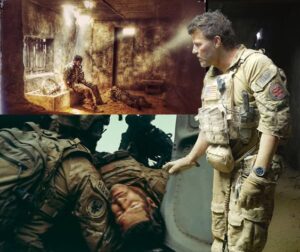
Introduction: CBS’s SEAL Team Challenges Military Clichés
Since its debut, SEAL Team has garnered attention for its gritty portrayal of Navy SEALs, offering a glimpse into the high-stakes world of elite military operatives. While the show has been praised for its realism, it has also faced criticism for occasionally leaning into military clichés. However, SEAL Team often manages to rebuke these tropes, creating a more authentic and nuanced narrative. In this article, we’ll explore how the series challenges common military clichés, as well as instances where it strikes the right balance between drama and realism.
What Are Military Clichés in TV Shows?
H2: Common Tropes Found in Military Dramas
Military dramas often rely on a set of recognizable tropes that viewers expect to see: the tough, emotionless soldier; the war hero overcoming impossible odds; and the camaraderie between soldiers that borders on melodrama. These clichés have become so ingrained in pop culture that they are often used without question in TV shows and films about the military. While these elements can work in certain contexts, they sometimes oversimplify the complex realities of military life.
How SEAL Team Breaks Away from Traditional Military Clichés
H2: Realistic Depictions of War and Its Aftermath

One of the standout features of SEAL Team is its attempt to provide a more nuanced look at the emotional and psychological toll that war takes on soldiers. Unlike many military-themed shows that glorify combat, SEAL Team frequently portrays the emotional scars that come with each mission. Characters like Jason Hayes (David Boreanaz) and Clay Spenser (Max Thieriot) struggle with PTSD, the weight of their decisions, and the impact of loss on their personal lives.
H3: Depicting the Complexity of Military Relationships
Rather than solely focusing on the intense action sequences, SEAL Team delves into the complex relationships between the members of Bravo Team. The show highlights the tension that can exist between duty and personal life, exploring how soldiers cope with separation from their families and the psychological strain of being part of an elite unit. This level of emotional depth challenges the often shallow portrayal of military camaraderie seen in other shows.
When SEAL Team Falls into Military Tropes
H2: The Action-Packed Heroic Feats
Despite its efforts to present a more realistic portrayal, SEAL Team sometimes falls into the trap of using action-packed, heroic moments that resemble typical military clichés. Episodes featuring daring rescues, narrowly avoided deaths, and impossible missions can feel somewhat formulaic. While these scenes add excitement and drama, they occasionally detract from the grounded storytelling the show is known for.
H3: The “Lone Wolf” Soldier Archetype
Another cliché that SEAL Team occasionally embraces is the “lone wolf” archetype, where a soldier, often in a moment of personal crisis, goes rogue to complete a mission alone. While these storylines offer opportunities for character growth and tension, they can feel predictable and overly dramatized. The tension between individualism and team dynamics is an ongoing theme in the series, but the occasional reliance on the lone wolf trope can undermine the team-based ethos that SEAL Team often promotes.
What SEAL Team Does Right in Challenging Clichés
H2: Focusing on Mental Health and PTSD
One of the show’s most significant departures from traditional military drama is its commitment to exploring the mental health challenges faced by soldiers. PTSD is a real and pervasive issue among military personnel, and SEAL Team addresses this head-on. Jason Hayes’ battle with PTSD, Clay’s struggles with guilt and trauma, and the team’s overall emotional struggles are treated with sensitivity and authenticity. This portrayal is a stark contrast to the heroic, invincible soldiers often seen in other military dramas.
H3: Bringing Humanity to the Frontlines
The show’s focus on humanizing the characters sets it apart from many other military-themed series. Rather than simply focusing on combat and heroism, SEAL Team spends a considerable amount of time showing the emotional toll of war. The team members are flawed, vulnerable, and real. This focus on humanity makes their victories feel earned and their losses truly heartbreaking.
The Impact of SEAL Team on Military Television
H2: Raising the Bar for Realistic Military Dramas
SEAL Team has raised the bar for realistic military dramas by balancing intense action with emotional depth. The series successfully challenges clichés by refusing to glorify the military and instead offering a nuanced perspective on what it means to be a soldier in today’s world. By focusing on mental health, the personal struggles of the characters, and the realities of warfare, SEAL Team stands out as a show that both entertains and educates its audience.
H3: Changing the Narrative on Military Service
While SEAL Team is not without its flaws, it has undeniably changed the narrative surrounding military service on television. The series provides a more balanced portrayal of soldiers, showing them as individuals with their own personal battles and triumphs. This shift in perspective allows the show to challenge preconceived notions about military life and offer a more truthful, complex portrayal of the men and women who serve.
Conclusion: SEAL Team Balances Drama and Realism
SEAL Team walks a fine line between drama and realism, often defying the typical clichés associated with military TV shows. By focusing on the emotional and psychological impacts of war, the series provides a fresh and authentic perspective that challenges traditional portrayals of soldiers. However, it’s not immune to the occasional action-packed moment or heroic rescue, which sometimes veer into cliché territory.
Ultimately, SEAL Team succeeds in its goal of offering a more nuanced portrayal of military life. It doesn’t shy away from the difficulties soldiers face, but it also delivers the adrenaline-pumping moments that fans expect from a military drama. As the series continues, it’s clear that SEAL Team will remain a key player in the evolution of military television, redefining what it means to be a hero on-screen.
FAQs
Q1: Does SEAL Team accurately portray the emotional impact of war?
Yes, SEAL Team is known for its realistic portrayal of the emotional and psychological toll of war, particularly through characters like Jason Hayes and Clay Spenser who struggle with PTSD and other personal challenges.
Q2: Does SEAL Team rely on military clichés?
While SEAL Team occasionally leans into some traditional military drama tropes, such as daring rescues and the “lone wolf” soldier, it often challenges these clichés by focusing on emotional depth and realistic depictions of military life.
Q3: How does SEAL Team portray the relationships within Bravo Team?
The show emphasizes the complexity of the relationships between team members, showcasing both the camaraderie and the personal struggles that come with being part of an elite military unit.
Q4: What makes SEAL Team different from other military dramas?
SEAL Team sets itself apart by focusing on the mental health of its characters, depicting their vulnerabilities and struggles, and providing a more nuanced portrayal of what it means to be a soldier in modern times.
Q5: Will SEAL Team continue to challenge military clichés in future seasons?
Given its commitment to realistic storytelling and emotional depth, it’s likely that SEAL Team will continue to challenge military clichés and provide a fresh perspective on military life in future seasons.